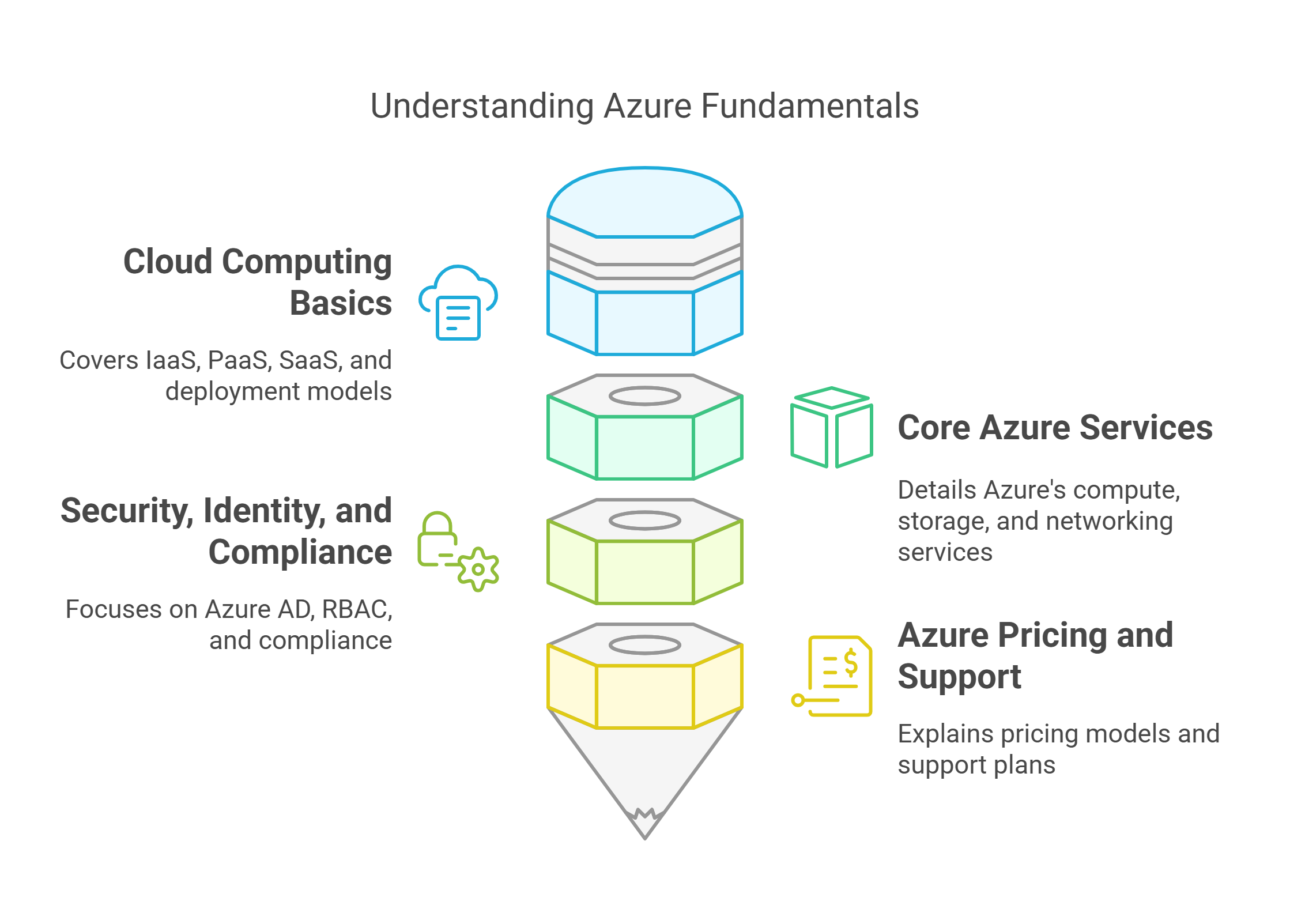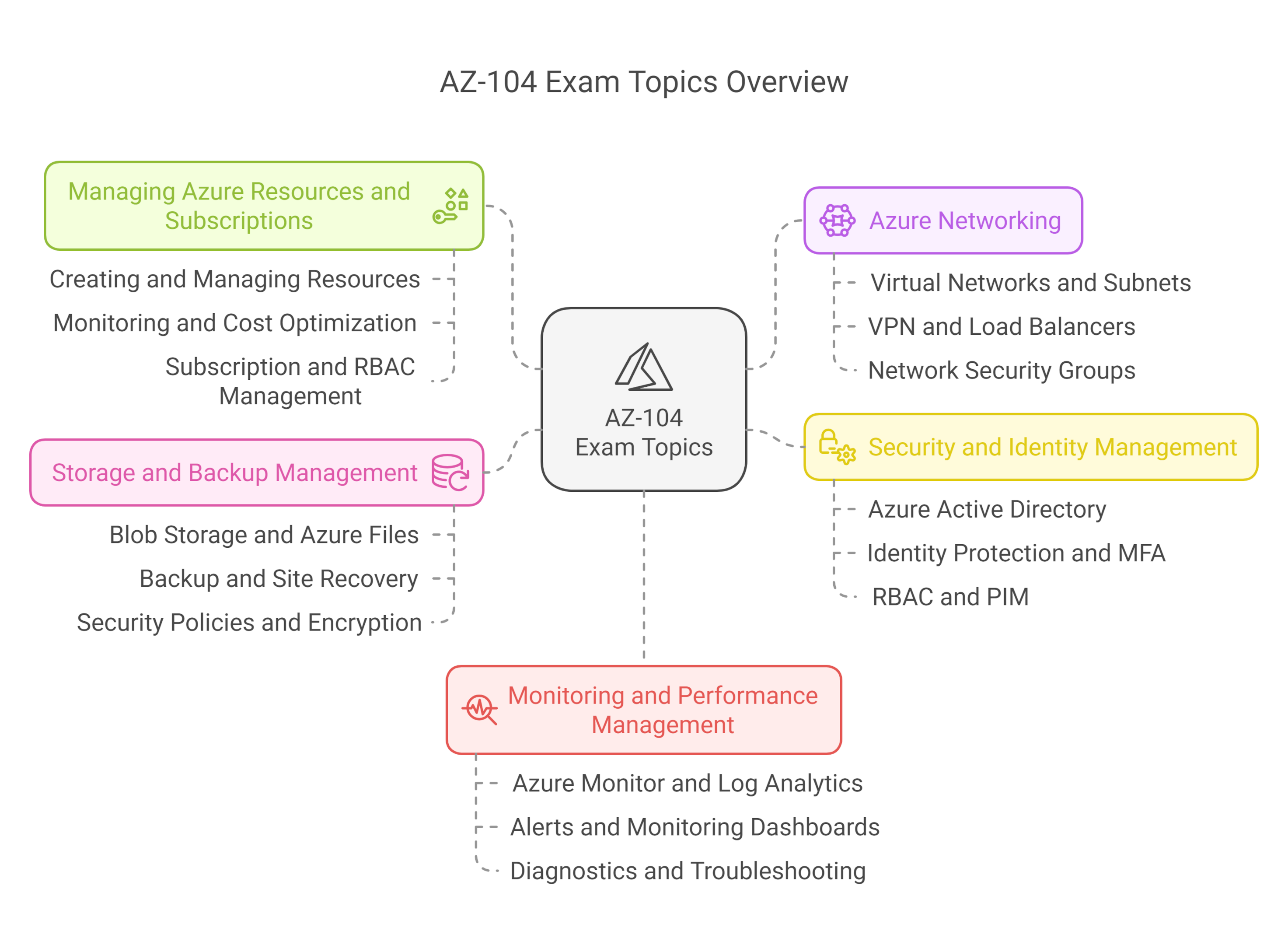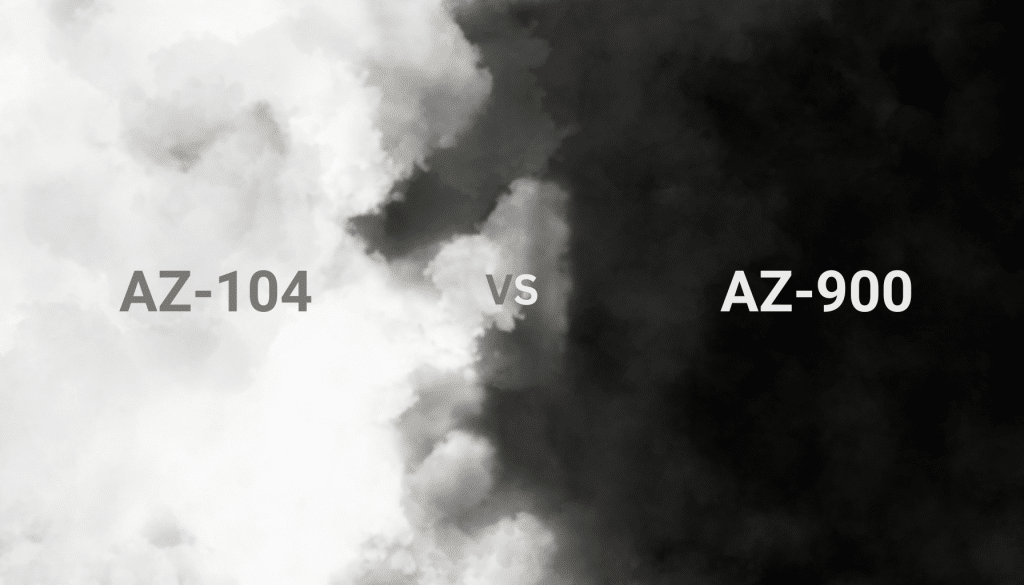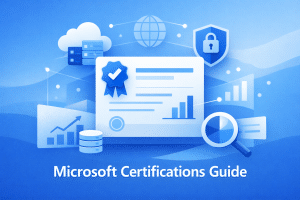Microsoft Azure certifications are among the most sought-after credentials in cloud computing. Whether you’re an aspiring cloud professional or an experienced IT expert looking to validate your skills, choosing the right certification path can be challenging. Two of the most commonly debated certifications are AZ-900 (Microsoft Azure Fundamentals) and AZ-104 (Microsoft Azure Administrator).
Since both certifications focus on Azure, many wonder whether they should start with AZ-900 as a foundational step or skip it entirely and go straight to AZ-104. The answer depends on your experience level, career goals, and understanding of cloud computing.
To help you make an informed decision, this guide breaks down exam details, difficulty levels, career benefits, salary impact, and more, so you know which certification is best for your journey into Azure.
Comparison
| Feature | AZ-104 (Microsoft Azure Administrator) | AZ-900 (Microsoft Azure Fundamentals) |
| Exam Level | Associate (Intermediate) | Fundamental (Beginner) |
| Intended Audience | IT professionals, Azure administrators, system engineers | Beginners, non-technical individuals, business users |
| Exam Cost | $165 USD (varies by location) | $99 USD (varies by location) |
| Prerequisites | Basic experience with Azure (not mandatory but recommended) | No prerequisites required |
| Exam Duration | 120 minutes | 60 minutes |
| Number of Questions | 40–60 questions | 30–50 questions |
| Question Format | Multiple-choice, case studies, drag-and-drop, and scenarios | Multiple-choice, drag-and-drop, true/false |
| Passing Score | 700/1000 | 700/1000 |
| Difficulty Level | Intermediate | Beginner |
| Topics Covered | Azure identity & governance, storage, networking, compute, security, monitoring, and backup | Cloud concepts, Azure services, security, pricing, and support |
| Hands-on Experience Needed? | Yes, recommended to have practical Azure experience | No, theoretical understanding is enough |
| Who Should Take It? | Those who manage Azure services, including virtual machines, networking, and security | Anyone new to Azure or cloud computing concepts |
| Certification Validity | 1 year (renewable) | No expiration |
| Renewal Requirement | Free renewal assessment each year | No renewal required |
| Career Opportunities | Azure Administrator, Cloud Engineer, IT Operations, System Administrator | Business Analyst, Sales, Marketing, Entry-level IT roles |
| Best Preparation Resources | Microsoft Learn, Hands-on Labs, Practice Tests, Exam Dumps | Microsoft Learn, Free Training Modules, Practice Tests |
| Exam Registration | Via Microsoft or Pearson VUE | Via Microsoft or Pearson VUE |
AZ-104 or AZ-900 – Which One Should You Take First?
Jumping into Azure certs and feeling stuck between AZ-900 and AZ-104? You’re not alone. These two are among the most popular Microsoft Azure certs, but picking the right one first isn’t as simple as it seems. Some say start with AZ-900, while others swear you can skip it and go straight to AZ-104.
Truth is, it depends on your background, job goals, and how deep you wanna go into Azure. If you’re just getting into cloud computing, AZ-900 might feel like a safe starting point. But if you already work in IT, AZ-104 could be the better move since it focuses on hands-on cloud admin work.
So before you book an exam, let’s break things down. Who benefits from each? Which one should you take first? What do they actually test? And which one helps more in landing a job?
Why Do People Compare AZ-900 and AZ-104 So Much?
It’s simple. Both certs focus on Azure, but they serve different purposes. Microsoft recommends AZ-900 as the entry-level cert and AZ-104 as the next step for Azure admins. But the thing is, you don’t have to take AZ-900 before AZ-104. That’s where all the confusion starts.
Some people assume AZ-900 is a must before AZ-104, but it’s not. You can take AZ-104 without touching AZ-900 at all. The key question is, do you need that extra foundation first, or can you handle jumping straight to the admin level?
For a full breakdown of the exam structure, difficulty, and the latest updates, explore our AZ-104 certification key stats and exam insights.
Understanding AZ-900: What’s in the Exam
AZ-900 is Microsoft’s Azure Fundamentals certification, designed as an entry-level introduction to cloud computing and Azure services. If you’re just getting started, our detailed AZ-900 Certification Guide covers everything you need to know, including study tips and key exam insights. It’s often seen as the first step for those new to the cloud, but what does it actually cover? And is it worth taking?
What Does AZ-900 Cover?
AZ-900 is not a deep technical certification, it focuses on understanding cloud concepts rather than implementing them. You won’t be configuring VMs or setting up Azure networking here. Instead, the exam is built around these key topics:
1. Cloud Computing Basics
- What is cloud computing? Understanding IaaS, PaaS, and SaaS.
- Cloud deployment models: Public, Private, and Hybrid.
- Benefits of cloud computing: Scalability, cost efficiency, security, high availability.
2. Core Azure Services
- Overview of Azure’s compute, storage, and networking services.
- Basics of Azure Virtual Machines (VMs), Azure Kubernetes Service (AKS), and Azure App Services.
- Deep understanding Azure data services, data storage, data platforms, Blob Storage, File Storage, and Databases.
- How Azure Networking works: VNets, Load Balancers, VPN Gateways.
3. Security, Identity, and Compliance
- Basics of Azure Active Directory (Azure AD) and role-based access control (RBAC).
- Fundamentals of firewalls, DDoS protection, encryption, and security center.
- Microsoft’s compliance offerings—GDPR, ISO, SOC, HIPAA.
4. Azure Pricing and Support
- How Azure’s pricing and billing model works.
- Understanding Azure Cost Management and Azure Free Tier.
- Comparing Azure pay-as-you-go, reserved instances, and hybrid benefits.
- Support plans and SLA agreements in Azure.

Does AZ-900 Have Any Hands-On Labs?
No, AZ-900 is a conceptual exam, meaning it does not require hands-on experience with Azure. You don’t need to configure or troubleshoot services, it’s all multiple-choice, drag-and-drop, and case-study questions.
That said, Microsoft offers sandbox labs for AZ-900 through Microsoft Learn, where you can get some guided practice on Azure services. If you want to boost your chances of passing on the first attempt, high-quality AZ-900 Exam Dumps from Cert Empire can be a great study resource. However, these aren’t part of the exam, they just help reinforce the topics.
If you’re looking for real hands-on Azure work, AZ-900 won’t give you that. It’s purely theoretical, unlike AZ-104, which requires practical knowledge.
Who Benefits the Most from Taking AZ-900?
AZ-900 is ideal for people who need a general understanding of cloud computing and Azure without getting into the deep technical side. It’s useful for:
✔ Complete Beginners – If you have no prior experience with cloud computing, AZ-900 is a good starting point. It helps you understand the fundamentals before moving to more technical certs.
✔ Non-Technical Roles – If you work in sales, marketing, management, or product development and need to understand how Azure fits into business solutions, AZ-900 is a great way to learn the basics.
✔ IT Professionals Transitioning to Cloud – If you’ve been working in traditional IT (networking, sysadmin, or software development) and want to start exploring Azure, AZ-900 gives you a solid introduction before diving into hands-on certifications like AZ-104.
✔ Students and Job Seekers – If you’re looking to add Azure knowledge to your resume but aren’t ready for a technical exam, AZ-900 is a low-risk, low-cost certification that can help you stand out.
Who Might Skip AZ-900?
- Experienced IT professionals – If you already have hands-on experience with Azure or other cloud platforms like AWS or Google Cloud, AZ-900 might feel too basic.
- Those aiming for technical Azure roles – If you’re planning to become an Azure Administrator, Engineer, or Architect, AZ-104 or other role-based certs will be more valuable.
- Developers looking for coding-based cloud certs – If you’re a developer, you might be better off with AZ-204 (Azure Developer Associate) instead.
Breaking Down AZ-104: What Makes It Different?
AZ-104 isn’t just another cloud cert, it’s a technical, hands-on certification that proves you can manage Azure environments in real-world scenarios. If you’re looking for a deep dive into the exam syllabus, difficulty level, and best study strategies, check out our AZ-104 Certification Guide. While AZ-900 gives you a broad understanding of Azure, AZ-104 is about actually working with Azure services, troubleshooting, and securing cloud environments. If AZ-900 is the theory, AZ-104 is the practical lab.
For IT pros who want to move beyond basic cloud concepts and start working as Azure administrators, cloud engineers, or system admins, AZ-104 is the certification that validates their skills.
What Does AZ-104 Cover?
Unlike AZ-900, which is mostly multiple-choice theory-based, AZ-104 focuses on real-world Azure administration tasks. Here’s a breakdown of the core areas it tests:
1. Managing Azure Resources and Subscriptions
- Creating and managing Azure resources (VMs, storage accounts, databases).
- Monitoring resource usage and optimizing costs.
- Managing Azure subscriptions and role-based access control (RBAC).
2. Azure Networking
- Configuring Azure Virtual Networks (VNets) and setting up subnets.
- Implementing VPN Gateways, Load Balancers, and Application Gateways.
- Managing network security groups (NSGs) and private endpoints.
3. Security and Identity Management
- Implementing Azure Active Directory (Azure AD).
- Managing identity protection, multi-factor authentication (MFA), and conditional access.
- Controlling user access through RBAC and Privileged Identity Management (PIM).
4. Storage and Backup Management
- Configuring Blob Storage, Azure Files, and Disk Storage.
- Managing data backup, site recovery, and Azure Storage replication.
- Implementing security policies and encryption for Azure storage.
5. Monitoring and Performance Management
- Using Azure Monitor, Log Analytics, and Application Insights.
- Setting up alerts, metrics, and monitoring dashboards.
- Configuring diagnostics and troubleshooting performance issues.
Unlike AZ-900, which only talks about these features at a high level, AZ-104 requires you actually to configure, manage, and troubleshoot these services.

Does AZ-104 Require Hands-On Knowledge?
Yes, and this is what makes it significantly harder than AZ-900. You can’t just memorize theory and pass, it requires practical experience with Azure.
Microsoft expects AZ-104 candidates to have:
- At least 6 months of experience working with Azure administration tasks.
Hands-on experience configuring Azure VMs, networking, and storage.
A solid understanding of Azure AD, security policies, and identity management.
The ability to deploy, manage, and monitor Azure workloads.
If you’ve never worked with Azure in a live environment, passing AZ-104 can be tough. Many candidates set up an Azure free trial account to practice real-world scenarios before attempting the exam.
To boost your chances of passing on the first attempt, check out our AZ-104 exam proven tips and study resources for step-by-step guidance and the best prep material.
Is AZ-104 Too Technical for Beginners?
It depends on your background. If you’re completely new to IT and cloud computing, AZ-104 might feel overwhelming. It’s an admin-level certification, so it’s best suited for:
- System administrators moving to the cloud.
- Network engineers who want to specialize in Azure networking.
- Cloud support engineers looking to advance their skills.
- IT professionals already working with on-prem infrastructure (Windows Server, VMware) and transitioning to Azure.
If you don’t have any technical background, it’s usually recommended to start with AZ-900 or gain some basic IT skills before jumping into AZ-104.
What Real-World Job Skills Does AZ-104 Validate?
AZ-104 isn’t just about passing an exam, it’s about demonstrating practical Azure skills that companies need. Getting AZ-104 certified proves that you can:
- Deploy and manage Azure workloads – Set up VMs, containers, and databases.
- Configure and troubleshoot Azure networking – Manage VNets, VPNs, and security policies.
- Secure Azure environments – Implement Azure AD, access controls, and encryption.
- Monitor cloud infrastructure – Set up logs, alerts, and cost management tools.
- Manage identity and access – Configure role-based access and authentication policies.
Employers hiring for Azure Administrator, Cloud Engineer, or IT Support roles often list these skills as requirements, and AZ-104 validates that you actually have them.
How Do AZ-104 and AZ-900 Compare?
When deciding between AZ-900 and AZ-104, it’s important to understand how they differ in exam structure, content, difficulty, and cost. AZ-900 is an entry-level certification focusing on cloud concepts, while AZ-104 is a more advanced exam that requires hands-on Azure experience. Let’s break down the key differences.
Exam Format – What to Expect in the Test Environment
The structure of the exams is very different because AZ-900 tests general cloud knowledge, while AZ-104 focuses on practical administration tasks.
AZ-900 Exam Format
- Number of Questions: 40-60
- Duration: 45-60 minutes
- Question Types:
- Multiple-choice questions
- Drag-and-drop matching
- Case study scenarios
- Yes/No questions
- Difficulty Level: Beginner
- Passing Score: 700/1000
AZ-900 is mainly conceptual. The questions test your understanding of cloud computing principles, Azure services, pricing models, and security basics. You won’t need hands-on experience, just a solid grasp of theoretical concepts.
AZ-104 Exam Format
- Number of Questions: 40-60
- Duration: 120 minutes
- Question Types:
- Multiple-choice questions
- Case studies
- Hands-on scenario-based problems
- Drag-and-drop
- Difficulty Level: Intermediate to Advanced
- Passing Score: 700/1000
AZ-104 is more technical and hands-on. It tests your ability to manage Azure services in real-world situations. To maximize your preparation, consider using AZ-104 Exam Dumps from Cert Empire, which provide real-world scenarios and practice questions. Expect scenario-based questions where you need to apply knowledge about networking, identity management, and troubleshooting cloud environments.
Coverage – What Topics Are Included in Each Exam?
The scope of these exams is completely different. AZ-900 is broad but shallow, while AZ-104 is deep and technical.
AZ-900: Fundamental Cloud Concepts and the Azure Ecosystem
AZ-900 introduces the basics of Azure, making it ideal for beginners and non-technical professionals. It covers:
- Cloud computing fundamentals – IaaS, PaaS, SaaS models.
- Azure core services – Virtual Machines, Storage, Networking, and Security.
- Pricing and billing – How Azure charges for services.
- Security and compliance – Role-Based Access Control (RBAC), data privacy, governance.
AZ-104: In-Depth Azure Administration and Cloud Management
AZ-104 is designed for IT professionals who will actively manage Azure environments. It covers:
- Azure resource management – Creating and managing Virtual Machines (VMs), Storage, and Networking.
- Identity and security – Azure Active Directory (AD), Multi-Factor Authentication (MFA), Role-Based Access Control (RBAC).
- Networking – Virtual Networks (VNets), VPNs, Load Balancers, Firewalls, and DNS.
- Monitoring and troubleshooting – Using Azure Monitor, setting alerts, and managing performance.
Difficulty and Preparation Time – Which One Demands More Effort?
AZ-900 is a straightforward exam, requiring only a basic understanding of cloud principles. AZ-104, however, is a technical certification that demands hands-on experience.
AZ-900 Difficulty and Study Time
- Level: Beginner
- Study Time Required: 1-3 weeks
- Resources:
- Microsoft Learn AZ-900 free learning path
- Udemy or Pluralsight courses
- Practice tests
Since AZ-900 does not require hands-on experience, most candidates pass within 1-3 weeks of study, even with no prior Azure knowledge.
AZ-104 Difficulty and Study Time
- Level: Intermediate to Advanced
- Study Time Required: 4-8 weeks (or longer without Azure experience)
- Resources:
- Microsoft Learn AZ-104 training modules
- Udemy/A Cloud Guru courses
- Azure Hands-on Labs
- Practice exams
AZ-104 requires real-world Azure experience. If you haven’t worked with Azure before, expect to spend at least 6-8 weeks learning and practicing in a free-tier Azure account.
Is the Price Justified?
- AZ-900 is cheaper, but it doesn’t add much value for technical roles. It’s a good starting point but won’t boost your salary.
- AZ-104 costs more, but it’s a technical certification that directly impacts job opportunities and salary.
Additional Costs
- Study materials: Online courses, books, and practice tests can cost $30-$200 depending on quality.
- Azure sandbox environment: While Microsoft offers free-tier access, some hands-on labs require a paid Azure subscription.
- Retake fees: If you fail, you’ll need to pay again to retake the exam.
Which Exam Gives You the Best ROI?
- If you just want a basic cloud cert, AZ-900 is fine. It’s affordable and easy to pass, but it won’t significantly improve your job prospects.
- If you’re serious about an Azure career, AZ-104 is worth the extra cost. It validates real cloud admin skills, which employers are actively looking for.
Career Growth with AZ-104 vs AZ-900
Both AZ-900 and AZ-104 can add value to your career, but they lead to different job opportunities, salary expectations, and long-term growth potential. AZ-900 is more of an introductory certification, while AZ-104 is a technical, job-focused certification that can land you actual Azure-related roles.
Salary – Does One Certification Pay More Than the Other?
One of the biggest questions people have when choosing between these certifications is: Will AZ-900 or AZ-104 increase my salary?
Salary Expectations for AZ-900 vs AZ-104 Certified Professionals
AZ-900 alone is not a job-ready certification, so its impact on salary is minimal. It’s mostly useful as an introduction to Azure for those in non-technical roles or beginners in cloud computing.
On the other hand, AZ-104 validates hands-on Azure administration skills, making it a valuable credential for IT professionals. Employers actively look for AZ-104-certified candidates for cloud administration roles, which tend to pay significantly more.
Here’s a rough breakdown of average salaries based on certification:
| Certification | Average Salary (USD) |
| AZ-900 (basic cloud knowledge) | $50,000 – $75,000 |
| AZ-104 (Azure administrator skills) | $80,000 – $120,000 |
Is AZ-900 Worth It If You’re Aiming for Higher-Paying Roles?
If your goal is a high-paying technical role in cloud computing, AZ-900 won’t be enough on its own. Employers don’t see it as a technical certification, so it doesn’t translate into higher salaries.
However, if you’re in a business or sales role and just need basic Azure knowledge, AZ-900 can be useful for internal promotions or switching to cloud-focused roles. But if you want real career growth and higher pay, AZ-104 is the better investment.
Job Roles – Where Do These Certifications Lead?
AZ-900 and AZ-104 target completely different job markets.
AZ-900: Entry-Level Cloud Roles, Sales, Customer Support, Non-Technical IT
Since AZ-900 is a theoretical certification, it doesn’t prepare you for technical roles. Instead, it’s useful for:
- Cloud Sales Representatives – Those selling cloud solutions to businesses.
- Customer Support Representatives – Support agents who need a basic understanding of Azure.
- Business Analysts & Project Managers – Professionals working on cloud-related projects.
- Students & Career Changers – Those exploring cloud computing but not yet ready for hands-on roles.
Employers don’t usually list AZ-900 as a job requirement, so having it doesn’t guarantee career progression.
AZ-104: System Administrators, Cloud Engineers, and Security Specialists
AZ-104, on the other hand, is designed for technical IT roles that involve managing and securing Azure environments. Some of the most common jobs that require AZ-104 include:
- Azure Administrator – Manages Azure services, storage, networking, and security.
- Cloud Engineer – Deploys and manages cloud solutions for businesses.
- System Administrator – Handles virtual machines, backups, and networking in the cloud.
- Security Administrator – Manages identity, access controls, and compliance in Azure.
Many job descriptions specifically list AZ-104 as a requirement, making it a much stronger certification for career growth.
Industry Demand – Are Employers Looking for AZ-900 or AZ-104 More?
Which Certification Is More in Demand Across Industries?
Between the two, AZ-104 is in much higher demand for azure administrator associate jobs.
Most IT job listings mention AZ-104 as a preferred or required certification, while AZ-900 is rarely a job requirement. Employers want hands-on skills, which AZ-900 doesn’t provide.
That said, AZ-900 can be useful in non-technical industries where understanding cloud concepts is important, such as:
- Finance & Banking – Companies migrating to the cloud need employees familiar with cloud pricing and compliance.
- Retail & E-commerce – Businesses using Azure for online services and data management.
- Sales & Consulting – Those selling or implementing Azure-based solutions.
How AZ-104 is a Stepping Stone to More Advanced Azure Certifications
AZ-104 is part of Microsoft’s certification path for higher-level Azure roles. Once you pass AZ-104, you can progress to advanced certifications like:
- AZ-305 (Azure Solutions Architect) – Ideal for designing complex Azure environments.
- AZ-500 (Azure Security Engineer) – For professionals focusing on cloud security and compliance.
- AZ-400 (DevOps Engineer) – For those working in automation and cloud development.
AZ-900, on the other hand, doesn’t lead to any technical certifications since it’s a standalone fundamentals exam.
Growth Potential – Which One Helps You Move Up Faster?
Does AZ-900 Open Doors for Career Progression?
Not really—AZ-900 is more of an introduction than a stepping stone. It helps you understand Azure, but it doesn’t prepare you for a technical job or higher-level certs.
It may help you get into cloud-adjacent roles like business analysis, sales, or project management, but if you want to work directly in Azure, you’ll need more technical certifications.
How AZ-104 Positions You for Long-Term Azure Career Growth
AZ-104 is a job-ready certification that can open doors to cloud administration roles. More importantly, it helps you move up the Azure certification ladder, leading to higher-paying jobs in cloud engineering, architecture, and security.
With AZ-104, you can:
✔ Apply for Azure Administrator, Cloud Engineer, and System Admin roles.
✔ Gain hands-on experience needed for more advanced certifications.
✔ Specialize in cloud security, networking, or DevOps for even higher salaries.
Prerequisites – Do You Need AZ-900 Before Taking AZ-104?
One of the most common misconceptions about Microsoft’s Azure certification path is that you must take AZ-900 before attempting AZ-104. That’s not true. Microsoft does not require AZ-900 as a prerequisite for AZ-104, meaning you can take AZ-104 directly without ever touching AZ-900.
However, just because you can skip AZ-900 doesn’t necessarily mean you should. The decision depends on your experience level, technical background, and career goals.
Can You Jump Straight to AZ-104 Without AZ-900?
Yes, AZ-900 is not required before AZ-104. Microsoft has structured its certification tracks so that professionals with technical experience can go straight to role-based certifications like AZ-104 without first passing the fundamentals exam.
AZ-900 is purely optional, intended for those who need a broad, non-technical introduction to cloud concepts before getting hands-on with Azure. If you’re already working in IT or have experience with other cloud platforms, AZ-900 might not be necessary for you.
When It Makes Sense to Skip AZ-900
Not everyone needs to take AZ-900 before AZ-104. In some cases, skipping AZ-900 is actually the better option. Here’s when it makes sense to bypass it:
- You Already Work in IT – If you have experience in networking, system administration, security, or cloud computing, you likely already understand the basics of cloud services. AZ-900 would feel repetitive and unnecessary.
- You Have Hands-On Experience with Cloud Platforms – If you’ve worked with AWS, Google Cloud, or on-prem virtualization platforms like VMware, then you probably don’t need an introductory course on cloud concepts.
- You’re Targeting a Technical Role in Azure – If you want to become an Azure Administrator, Cloud Engineer, or Solutions Architect, AZ-900 won’t add much value. Employers looking for Azure professionals care more about AZ-104 because it validates real technical skills.
- You Have Limited Time and Budget – If you’re paying out of pocket or your employer is covering only one certification, AZ-104 is the better investment. AZ-900 won’t significantly improve your job prospects, so if you’re aiming for a career boost, it’s better to go straight for AZ-104.
When AZ-900 Might Be Worth Taking First
While skipping AZ-900 is often the right choice for experienced IT professionals, there are situations where starting with AZ-900 makes sense:
- You’re New to Cloud Computing – If you’ve never worked with Azure, AWS, or any cloud service, AZ-900 gives you a gentle introduction to cloud computing without overwhelming you with technical details.
- You’re in a Non-Technical Role – If you’re in sales, project management, finance, or business analysis, AZ-900 helps you understand Azure’s core services, pricing, and governance—but you won’t need the deep hands-on knowledge required for AZ-104.
- You Want to Build Confidence Before Tackling a Technical Exam – AZ-104 can be challenging if you’re new to Azure, so some candidates prefer to take AZ-900 first as a warm-up before moving to AZ-104.
Ultimately, AZ-900 is helpful for beginners but unnecessary for IT professionals who already have cloud experience.
Certification Renewal – How Long Do They Last?
Both AZ-900 and AZ-104 expire after one year and require renewal if you want to keep your certification status active.
AZ-900 and AZ-104 Renewal Requirements
Microsoft used to offer lifetime certifications, but now, all role-based and fundamental certifications must be renewed annually.
- Renewal is free – Microsoft offers a free online renewal assessment on its certification dashboard.
- No need to retake the full exam – If you pass the renewal assessment, your certification is extended for another year.
- Renewal can be done online – No need to schedule a proctored exam.
Since renewal is free, there’s no extra cost as long as you pass the online assessment before your certification expires.
Is AZ-900 a One-Time Certification, or Does It Expire?
AZ-900 used to be a lifetime certification, meaning once you passed it, you never had to renew it. However, Microsoft changed its policy, and now AZ-900 must be renewed every year, just like AZ-104.
- If you don’t renew AZ-900, your certification status will become inactive, meaning it won’t appear as an active cert on your Microsoft profile.
- Renewing AZ-900 is usually easier than renewing AZ-104 since the fundamentals exam covers high-level concepts that don’t change as frequently as Azure admin tasks.
If you’re taking AZ-900 just as a learning experience, you might not need to worry about renewal. However, if you’re using it to build your resume or maintain employer-sponsored certifications, make sure to renew it annually.
Final Thoughts!
- If you just want to understand Azure, AZ-900 is fine—but it won’t boost your career much.
- If you want a cloud-related job with real growth potential, AZ-104 is the better investment.
- Employers actively look for AZ-104, while AZ-900 is mostly for learning purposes.
- Skipping AZ-900 is fine if you have IT experience, go straight for AZ-104 if you’re serious about working in Azure.
For long-term growth, AZ-104 is the way forward. It leads to better-paying jobs, advanced certifications, and real career opportunities in cloud computing. Get the best exam dumps by Cert Empire to ace these certifications.
FAQs
1. What is the main difference between AZ-900 and AZ-104?
AZ-900 is a beginner-level exam covering basic cloud concepts, while AZ-104 is for IT professionals who manage Azure services.
2. Who should take the AZ-900 exam?
Anyone new to cloud computing or Azure, including students and business users, should take AZ-900.
3. Is AZ-900 required before AZ-104?
No, AZ-900 is not a prerequisite for AZ-104, but it helps in understanding Azure basics.
4. Who should take the AZ-104 exam?
AZ-104 is for IT professionals who manage Azure resources like virtual machines, networking, and storage.
5. Which exam is harder, AZ-900 or AZ-104?
AZ-104 is harder because it tests hands-on Azure management skills, while AZ-900 focuses on basic concepts.


























